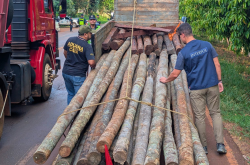The issues
The criminals responsible for illegal logging and illicit timber trafficking are not just destroying biodiversity but they also threaten the livelihoods of those reliant on forest resources. For example, criminal land clearing can cause landslides and deny forest-dependent communities access to food, medicine and fuel.
From a law enforcement perspective, forestry crime involves criminal activity in the forestry sector, covering the entire supply chain, from harvest and transportation to processing and selling. It also refers to criminal offences that facilitate such activity, including document fraud, corruption and money laundering.

Forestry crime is:
- The illegal exploitation of high-value endangered wood species (many of which are now CITES listed)
- Illegal logging in protected areas, on indigenous lands or outside concession boundaries
- Laundering of illegal harvested wood through plantation and agricultural front companies
- Document fraud and misdeclarations to conceal illegal activity and tax evasion.

Both illegal logging and the international trade in illicitly harvested timber have a serious economic, social and environmental impact. For example:
- It is estimated that such international crimes account for 15-30 per cent of all timber traded globally.
- The trade of illegally logged timber has an estimated value of between USD 51-152 billion annually, representing a major loss in tax revenues.
- Illegal logging is responsible for deforestation, habitat loss, species extinction, and contributes to global warming.
- Illicit proceeds from forestry crime may be used to fund conflicts.

Our response
The INTERPOL Forestry Crime team supports law enforcement working across the entire timber supply chain to disrupt international criminal networks. Specifically, we assist member countries by:
- Identifying the modus operandi and trafficking routes;
- enhancing intelligence exchange;
- coordinating cross-border operations and investigations that target networks involved in forestry crimes.
Furthermore, we conduct extensive training and capacity building for law enforcement agencies, with regional and national programmes in Asia, Europe and the Americas. We also help civil society organizations link up with law enforcement to share intelligence on illegal logging and other forestry crimes.
Sharing information on crime
INTERPOL notices
One of INTERPOL’s most important functions is to help police in its member countries share critical crime-related information using our system of international notices.
Police can use our notices to alert law enforcement in other countries of potential threats, or to ask for assistance in solving crimes.
Regional Investigative and Analytical Case Meetings (RIACM)
INTERPOL facilitates investigative and analytical case meetings to allow investigators from different countries and regions to discuss transnational cases of mutual interest and share information.
Operational Support Teams (OST)
INTERPOL can provide case-specific technical support through the deployment of Operational Support Teams. These teams consist of officers and analysts with specialized forensic, analytical and technical skills and crime area expertise who support national law enforcement authorities in ongoing investigations.

Criminal Intelligence Analysis
Criminal intelligence analysis supports the decision-making process for investigators, managers and other law enforcement to make the most efficient and effective use of their limited resources and ensure an intelligence-led policing approach.
The INTERPOL Environmental Security Programme produces analytical reports and provides the necessary criminal intelligence analysis to take informed and decisive enforcement action.
Illicit Markets Analysis File
The Illicit Markets Analysis File is a criminal intelligence database created for the collection of data from INTERPOL Member Countries.
This database holds intelligence specifically related to transnational organized crime in the fields of environmental, illicit goods and global health issues.
Related documents


Related news






